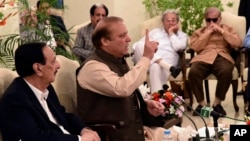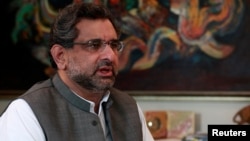Pakistan’s ruling party has appointed an interim chief executive of the country, raising opposition complaints, a day after the Supreme Court ousted Prime Minister Nawaz Sharif for concealing assets.
Sharif, 67, chaired an emergency meeting Saturday of his Pakistan Muslim League-N party in Islamabad, where leaders selected former petroleum minister Shahid Khaqan Abbasi as his successor for a short term of 45 days. Abbasi still must pass a vote of confidence by the parliament before assuming office.
Pakistan's president, Mamnoon Hussain, has summoned a special session of the National Assembly, the lower house of parliament, for Tuesday to elect the new prime minister. Sharif's party holds a majority in the chamber.
Party leaders also decided at their Saturday meeting that Sharif's younger brother, Shahbaz Sharif, would run in a parliamentary election for the seat vacated by the ousted prime minister so he could become a member of the national parliament and potentially take over as permanent prime minister of Pakistan, officials announced.
Under election rules and regulations, the byelection process takes 45 days to complete, and that is when Abbasi would step down, making way for the younger Sharif to take over as prime minister.
Shahbaz Sharif, 65, is currently the chief minister of Pakistan’s most populous province of Punjab.
Questioning dismissal
While addressing Saturday’s party meeting, the deposed prime minister again denied any wrongdoing and expressed his disappointment over his disqualification by the court.
"I still do not understand the grounds for my dismissal," Sharif said.
In his nationally televised speech Saturday he again asserted that charges against him and his family were baseless.
The Supreme Court, in its landmark verdict on Friday, also ordered a criminal investigation into Sharif and his children.
The corruption case against Sharif stemmed from leaked financial documents, known as the Panama Papers, that also listed three children of the Pakistani leader as holders of offshore accounts and posh London property.
Imran Khan comments
The opposition political party of cricket-star-turned-politician Imran Khan has been leading the legal effort against Sharif. He quickly reacted to Saturday’s comments by the deposed premier.
By nominating his brother for the office of the prime minister, Sharif “is insulting the nation’s intelligence and making mockery of democracy,” Khan said in a Twitter post. The opposition politician added that the Supreme Court also has directed anti-corruption authorities to investigate Shahbaz Sharif.
The Pakistani government completes its mandatory five-year constitutional term in June 2018 and the next national elections are due later that year.
The political turmoil has hit the nuclear-armed nation at a time when Pakistan’s relations with the United States have worsened over allegations Islamabad is not doing enough to stop militant attacks in neighboring Afghanistan. Additionally, Pakistan's political and military tensions with rival India have also worsened in recent months.
The political uncertainty grips Pakistan even though it is experiencing steady economic growth.
Opposition parties, however, are celebrating Sharif's removal from office, saying the court ruling has undone the widespread belief in Pakistan that powerful people cannot be held accountable.
Nawaz Sharif served as prime minister of Pakistan twice in the 1990s, but allegations of corruption and mismanagement of the economy led to his ouster from power both times. His last government in 1999 was dislodged by a bloodless military coup, and Sharif was later exiled to Saudi Arabia.
He returned to Pakistan in late 2007. His party won the 2013 national elections, bringing Sharif to power for a record third time in the troubled democratic history of a country that has experienced three military coups.






